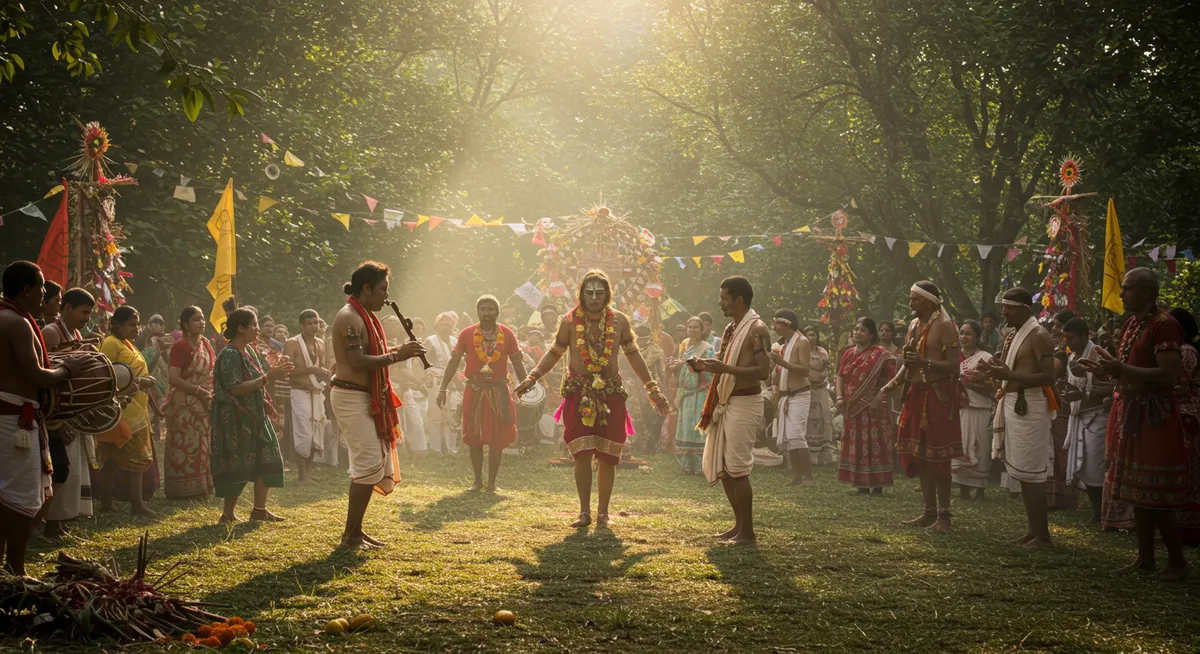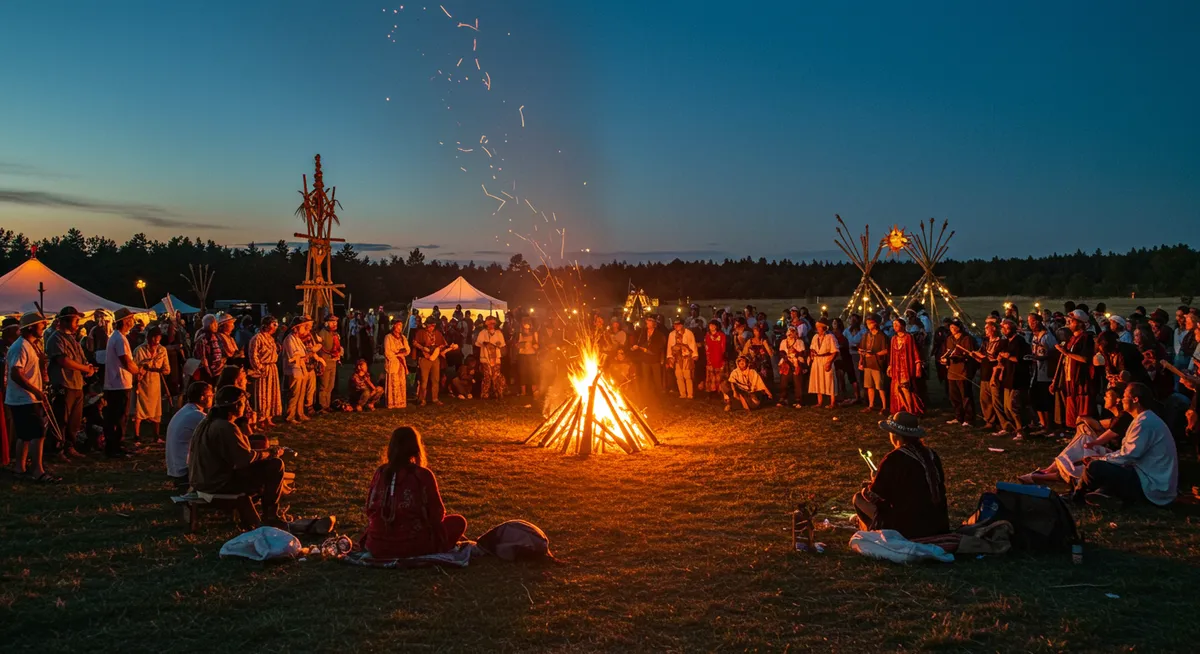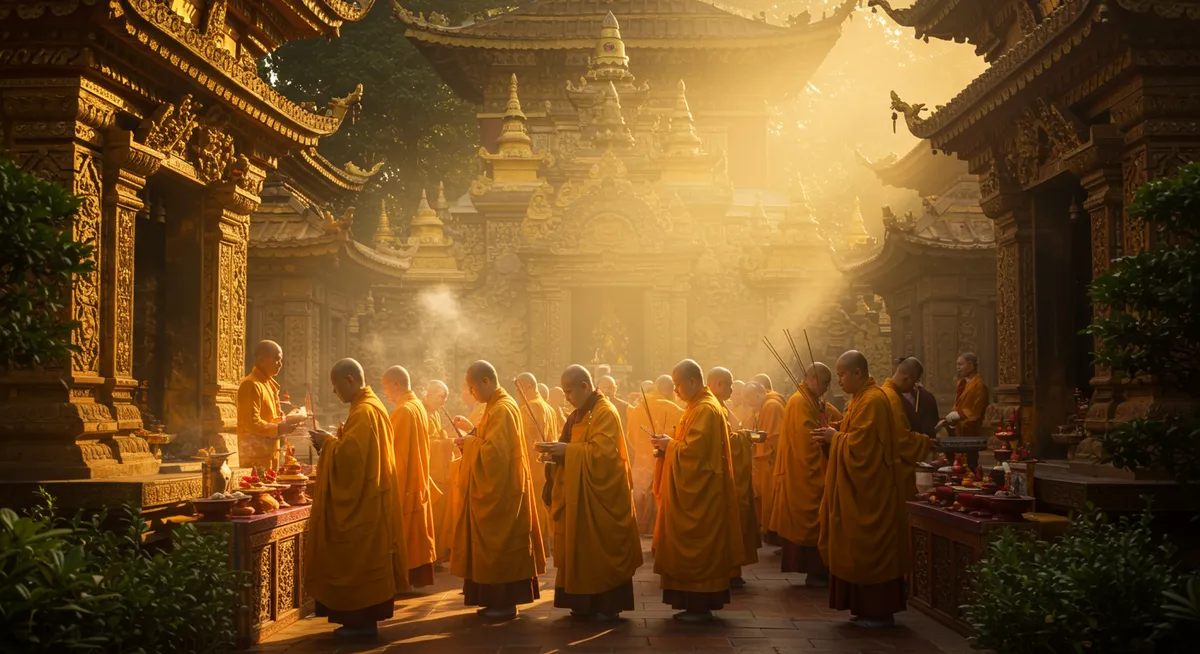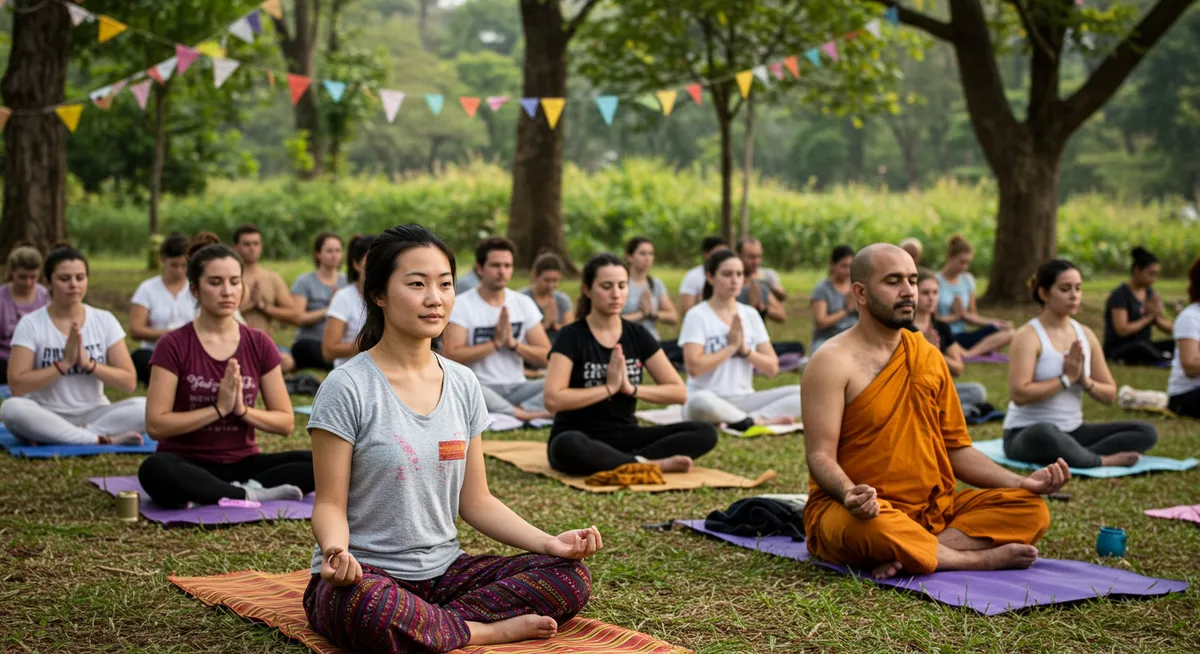Sacred Ceremonies & Local Rituals Guide | Authentic Spiritual Experiences

Sacred Ceremonies & Local Rituals: Experiencing Cultural Spirituality
Ritual practices represent some of humanity's most profound cultural expressions, encoding belief systems, cosmologies, and communal values that have evolved over centuries. For travelers seeking deeper cultural understanding, witnessing or participating in local rituals offers extraordinary insights into community identities and spiritual worldviews. This guide explores the diverse landscape of ceremonies and rituals worldwide, examining their significance and providing guidance for appropriate and meaningful engagement with these powerful cultural expressions.

The Cultural Significance of Ceremonies and Rituals
Ritual practices serve essential functions within communities that extend far beyond their visible expressions:
- Cultural Continuity: Rituals transmit cultural knowledge and values across generations, preserving heritage through embodied practice
- Cosmic Connection: Many ceremonies establish relationships between human communities and spiritual forces, deities, or natural cycles
- Transformative Experiences: Ritual participation often marks life transitions and creates profound personal transformations
- Community Cohesion: Shared ceremonial experiences strengthen social bonds and affirm collective identity
- Healing Practices: Many traditional rituals incorporate physical, psychological, and spiritual healing dimensions
Categories of Sacred Ceremonies and Local Rituals
The extraordinary diversity of ritual practices worldwide can be understood through several major categories:
Calendrical and Seasonal Rituals
These ceremonies mark important points in temporal cycles, helping communities navigate seasonal transitions:
- Solstice and Equinox Celebrations: From Indigenous sun dances to European midsummer festivals, celestial alignments inspire powerful ritual traditions
- Agricultural Ceremonies: Planting and harvest rituals acknowledge dependency on natural cycles and express gratitude for sustenance
- New Year Observances: Diverse cultural traditions mark annual renewal through purification practices, ancestor veneration, and community gatherings

Life Cycle Ceremonies
These rituals mark significant personal transitions, helping individuals navigate major life changes:
- Birth and Naming Ceremonies: Practices that welcome newborns into cultural and spiritual communities through blessing, protection, and identity rituals
- Coming of Age Traditions: Initiation ceremonies that mark the transition from childhood to adulthood through tests, teachings, and symbolic transformation
- Marriage Rituals: Ceremonies that unite couples while engaging extended families and communities in celebration and social bonding, often featuring specialized wedding attire and ceremonial garments
- Death and Ancestor Rituals: Practices supporting transition beyond physical life while maintaining connections between living communities and departed ancestors
Purification and Healing Ceremonies
These practices address physical, spiritual, and communal well-being through specialized ritual techniques:
- Sweat Lodge and Sauna Traditions: Heat-based purification practices found across Indigenous North American, Nordic, and Russian traditions
- Smoke Cleansing Ceremonies: From sage smudging to Bhutanese sang rituals, smoke purification appears in diverse spiritual systems
- Traditional Healing Ceremonies: Ritualized approaches to wellness combining plant medicine, spiritual invocation, and community support
- Water Rituals: Immersion and ablution practices across traditions, from baptism to Japanese misogi waterfall purification
Devotional and Spiritual Practices
These rituals express devotion and maintain relationships with spiritual forces:
- Prayer and Meditation Circles: Communal practices of focused contemplation, from Sufi zikr to Indigenous council circles
- Pilgrimage Traditions: Sacred journeys to powerful sites embodying physical movement as spiritual practice
- Offering Ceremonies: Acts of giving that create reciprocal relationships with deities, spirits, or ancestors, often involving ceremonial foods and ritual meals
- Communal Worship: Structured devotional practices bringing communities together in shared spiritual expression
Regional Ritual Traditions
Ritual practices reflect distinct cultural heritages while often sharing underlying principles:
Indigenous American Ceremonial Traditions
Ancient spiritual practices maintain connections to land, ancestors, and creation across diverse tribal cultures:
- Sweat Lodge Ceremonies: Purification rituals conducted in dome-shaped structures with heated stones and prayer
- Vision Quest Practices: Solo spiritual journeys involving fasting and communion with nature for guidance
- Powwow Gatherings: Community celebrations featuring drumming, dancing, and cultural renewal
- Sacred Pipe Ceremonies: Ritualized smoking practices that connect human, natural, and spiritual realms
Asian Ritual and Ceremonial Practices
Rich philosophical traditions and ancient wisdom practices shape diverse ceremonial expressions:
- Buddhist Temple Ceremonies: Meditative practices, offerings, and blessings that cultivate compassion and mindfulness
- Hindu Puja Rituals: Devotional practices honoring deities through offerings, mantra, and symbolic gestures
- Japanese Tea Ceremony: Contemplative ritual practice embodying harmony, respect, and mindfulness
- Shamanic Healing Traditions: From Mongolian to Hmong communities, spirit-mediated healing ceremonies address imbalance

African and Diaspora Spiritual Ceremonies
Traditions preserved through migration and cultural resilience connect communities to ancestral wisdom:
- West African Ancestor Ceremonies: Rituals maintaining connections with lineage ancestors through offerings and invocation
- Yoruba Divination Practices: Systems like Ifá that provide spiritual guidance through interpretive readings
- Vodou and Santería Ceremonies: Syncretic traditions honoring spirits (lwa or orishas) through music, dance, and possession
- Rastafari Reasoning Circles: Communal gatherings featuring drumming, meditation, and spiritual discourse
European and Mediterranean Ritual Traditions
Ancient folk practices blend with religious traditions in living ceremonial expressions:
- Orthodox Christian Ceremonies: Elaborate liturgical celebrations featuring incense, icons, and traditional chanting
- Pagan Revival Practices: Contemporary expressions of pre-Christian European spirituality marking seasonal cycles
- Mediterranean Holy Week Processions: Community-based passion plays and ritual processions in Catholic traditions
- Celtic and Norse Seasonal Celebrations: Fire festivals and nature-honoring practices revitalizing ancient traditions
Middle Eastern and Central Asian Ceremonies
Diverse spiritual traditions express devotion through ritual movement, music, and community:
- Sufi Whirling Ceremonies: Meditative spinning practices embodying surrender to divine presence
- Islamic Prayer Traditions: Daily ritual practices creating rhythm of devotion and community connection
- Jewish Shabbat and Holiday Rituals: Home-based ceremonies marking sacred time through candles, blessings, and festive meals
- Zoroastrian Fire Ceremonies: Ancient traditions honoring sacred fire as symbol of divine presence
Participating in Sacred Ceremonies and Local Rituals
For travelers seeking meaningful engagement with ritual traditions, several approaches offer authentic experiences:
Community-Based Ritual Experiences
Participating with local guidance ensures appropriate and welcome engagement:
- Public Ceremony Attendance: Many communities welcome respectful observers to public rituals like festivals and processions
- Cultural Centers and Organizations: Programs specifically designed to share ritual traditions with visitors in appropriate contexts
- Community-Led Tourism Initiatives: Locally managed experiences that maintain cultural integrity while sharing traditions
- Spiritual Retreats: Immersive programs offering deeper engagement with specific traditions under qualified guidance
Learning Ritual Arts and Practices
Developing skills connected to ceremonial traditions provides deeper understanding:
- Ritual Movement Practices: Learning sacred dance, martial arts forms, or ceremonial gestures with proper instruction, often performed at heritage sites with historical significance
- Sacred Music Traditions: Studying traditional instruments, chanting, or songs used in ceremonial contexts
- Ritual Craft Workshops: Creating objects used in ceremonies, from prayer flags to offering vessels, with cultural context
- Ceremonial Food Preparation: Learning to prepare foods with ritual significance under appropriate guidance
Ritual Retreat Experiences
Dedicated time in ceremonial environments offers transformative possibilities:
- Meditation and Prayer Retreats: Structured programs in monasteries, ashrams, or spiritual centers
- Traditional Healing Retreats: Guided experiences with indigenous healing traditions in appropriate cultural contexts
- Pilgrimage Journeys: Walking traditional sacred routes with ritual practices along the way
- Seasonal Ceremony Gatherings: Community celebrations marking solstices, equinoxes, or other calendar points

Preparing for Ceremonial Experiences
Meaningful participation in ritual traditions requires thoughtful preparation:
Cultural Research and Context
Understanding background information enhances respectful engagement:
- Historical and Cultural Context: Research the origins and significance of ceremonies before participating
- Spiritual Foundations: Learn about the belief systems that inform ritual practices
- Community Perspectives: Seek information from practitioners about proper approaches and expectations
- Contemporary Issues: Understand any concerns around cultural appropriation or commercialization
Physical and Mental Preparation
Many ceremonies require specific preparations for proper participation:
- Dietary Considerations: Some traditions request fasting or specific food restrictions before ceremonies
- Abstinence Practices: Temporary avoidance of alcohol, sexual activity, or certain foods may be recommended
- Physical Stamina: Some ceremonies involve extended periods of sitting, standing, or movement
- Psychological Readiness: Prepare for potentially intense emotional experiences in transformative rituals
Appropriate Dress and Offerings
Physical preparations demonstrate respect and cultural awareness:
- Modest and Respectful Attire: Research specific clothing requirements, which often involve covered shoulders, knees, or head
- Traditional Garments: When appropriate, wearing traditional clothing may be welcomed
- Suitable Offerings: Learn about appropriate gifts for hosts, spiritual leaders, or ceremonial purposes
- Ritual Items: Some ceremonies require specific personal items for participation
Ethical Considerations for Ceremony Participation
Approaching ritual experiences with cultural respect ensures positive interactions:
- Community Permission: Ensure you are welcomed to participate rather than intruding on private ceremonies
- Appropriate Compensation: Fairly compensate ceremonial leaders and communities for shared knowledge
- Photography Limitations: Many ceremonies prohibit photography or recording; always request permission
- Authentic Lineages: Seek experiences led by individuals with proper traditional training and community recognition
- Symbolic Understanding: Recognize the difference between learning about symbols and appropriating them
The Transformative Impact of Ceremonial Experiences
Respectful engagement with ritual traditions can create profound personal and cultural benefits:
- Cross-Cultural Understanding: Ceremonial participation builds nuanced appreciation for different worldviews
- Spiritual Exploration: Rituals offer frameworks for exploring existential questions and meaning
- Personal Growth: Many ceremonies create space for significant inner transformation and healing
- Cultural Preservation: Respectful engagement supports communities in maintaining traditional practices
- Global Perspective: Ritual experiences reveal both human diversity and shared spiritual aspirations
Sacred ceremonies and local rituals provide windows into the deepest aspects of cultural identity and human spiritual expression. When approached with appropriate respect, humility, and preparation, these experiences can create profound connections that transcend typical tourism. By following community guidelines, learning proper cultural context, and participating with sincere interest, travelers can engage meaningfully with living ceremonial traditions while supporting their preservation for future generations.
Ready to explore sacred ceremonies and local rituals?
Discover opportunities to engage respectfully with living ritual traditions through community-based experiences around the world.
Check back soon for our upcoming spotlights on specific ceremonial traditions, including Indigenous healing ceremonies, Asian temple rituals, and European seasonal celebrations.
Explore More Cultural Experiences
Discover other ways to deeply engage with traditional cultural practices around the world:
Traditional Festival Foods
Taste authentic cuisines and discover the cultural heritage behind ceremonial and celebration foods worldwide.
Traditional Dress & Costume
Explore the rich textile traditions and cultural significance of ceremonial garments across diverse cultures.
Heritage Sites & Traditional Dances
Experience how traditional performances bring historical places to life through movement and music.
All Cultural Immersion Experiences
Return to our main guide on transformative cultural experiences that go beyond festival attendance.